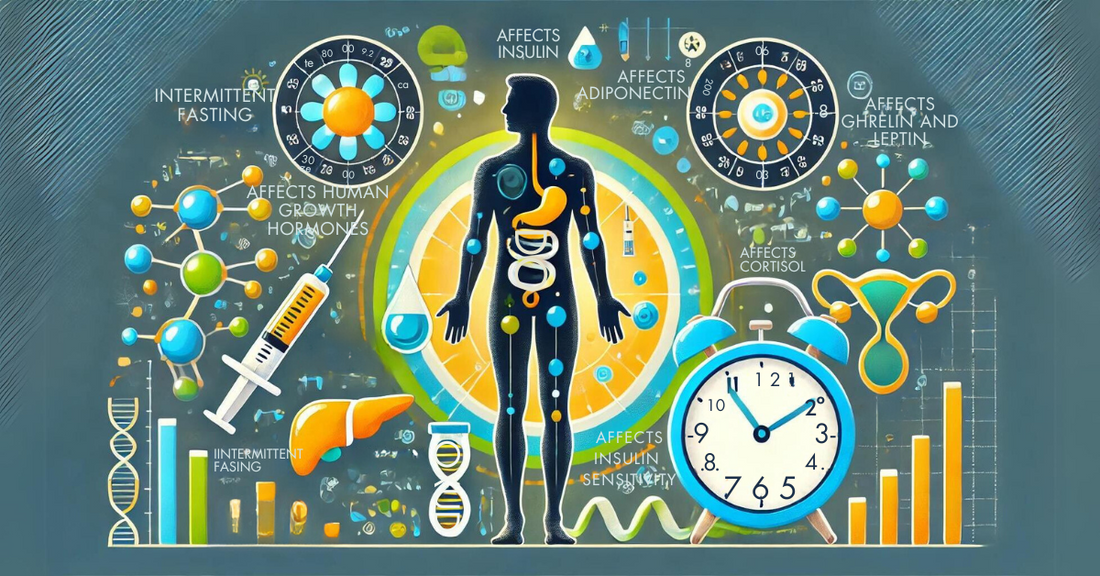
How Intermittent Fasting Affects Hormones: Insulin, Growth Hormone, and More
Share
Intermittent fasting (IF) has a profound impact on the body’s hormonal balance, influencing a variety of hormones that play critical roles in metabolism, growth, and overall health. Hormones such as insulin and human growth hormone (HGH) are significantly affected by periods of fasting, leading to numerous health benefits, including improved blood sugar control, increased fat burning, and muscle preservation. In this post, we will explore how intermittent fasting influences key hormones in the body and why these changes can be beneficial.
1. Lowering Insulin Levels and Improving Insulin Sensitivity
Insulin is a hormone that regulates blood sugar levels by facilitating the uptake of glucose into cells. When insulin levels are consistently high, the body can become less responsive to insulin, leading to insulin resistance, a precursor to type 2 diabetes.
Intermittent fasting helps lower insulin levels by reducing the frequency and duration of elevated blood sugar. During fasting periods, insulin levels drop, allowing the body to switch from glucose to fat as its primary energy source. Research indicates that intermittent fasting can lower insulin levels by 20-31% and improve insulin sensitivity, which helps reduce the risk of developing insulin resistance and type 2 diabetes .
By reducing the body's exposure to high insulin levels, intermittent fasting not only enhances fat burning but also improves metabolic flexibility, allowing the body to switch more efficiently between burning glucose and fat for energy.
2. Increasing Human Growth Hormone (HGH) Levels
Human growth hormone (HGH) is essential for growth, cell repair, and metabolism. HGH helps maintain, build, and repair healthy tissue in the brain and other organs. It plays a vital role in muscle growth, fat metabolism, and overall physical performance.
Intermittent fasting has been shown to significantly increase HGH levels. During fasting periods, HGH secretion can increase by as much as five-fold. This rise in HGH supports fat burning, preserves lean muscle mass, and enhances recovery and muscle repair . A study published in the Journal of Clinical Endocrinology & Metabolism found that fasting can increase HGH levels, promoting muscle maintenance while encouraging fat loss .
3. Balancing Ghrelin and Leptin: Hunger and Satiety Hormones
Ghrelin, often referred to as the “hunger hormone,” stimulates appetite, while leptin, known as the “satiety hormone,” helps regulate energy balance by inhibiting hunger. Intermittent fasting has been shown to influence the levels of both these hormones, leading to improved appetite control and reduced cravings.
Research suggests that intermittent fasting can reduce ghrelin levels, thereby decreasing hunger and appetite over time. Simultaneously, fasting may improve leptin sensitivity, allowing the body to better recognize signals of fullness and satiety. Improved leptin sensitivity can help prevent overeating and support sustained weight loss .
4. Enhancing Adiponectin: The Fat-Burning Hormone
Adiponectin is a hormone released by fat cells that helps regulate glucose levels and fatty acid breakdown. Higher levels of adiponectin are associated with reduced inflammation, increased fat burning, and improved insulin sensitivity. Intermittent fasting has been shown to increase adiponectin levels, which enhances the body’s ability to burn fat for energy and maintain healthy blood sugar levels .
A study published in Metabolism: Clinical and Experimental found that intermittent fasting led to higher adiponectin levels, which were associated with better metabolic health markers, including lower triglycerides and improved cholesterol levels. This makes intermittent fasting a valuable strategy for those looking to improve metabolic health while losing fat.
5. Regulating Cortisol: The Stress Hormone
Cortisol, often referred to as the "stress hormone," is released by the adrenal glands in response to stress and low blood glucose. While cortisol is necessary for normal bodily function, chronically elevated levels can lead to negative health effects, such as increased abdominal fat, high blood pressure, and muscle breakdown.
Intermittent fasting may help regulate cortisol levels, although the effects can vary depending on the individual and the type of fasting regimen. Some studies suggest that fasting can lower cortisol levels by promoting metabolic flexibility and reducing the frequency of eating-induced cortisol spikes. However, prolonged or severe fasting might increase cortisol due to the body's stress response to perceived starvation .
Conclusion
Intermittent fasting has significant effects on various hormones that are crucial for metabolism, appetite regulation, growth, and overall health. By lowering insulin levels, increasing HGH, balancing ghrelin and leptin, enhancing adiponectin, and regulating cortisol, intermittent fasting helps create a hormonal environment that supports fat loss, muscle retention, and metabolic health. Whether you are looking to improve blood sugar control, enhance physical performance, or manage your weight more effectively, understanding how intermittent fasting influences your hormones is key to maximizing its benefits.
Sources:
- Mattson, M. P., Longo, V. D., & Harvie, M. (2017). Impact of Intermittent Fasting on Health and Disease Processes. Aging Research Reviews, 39, 46-58.
- Ho, K. Y., Veldhuis, J. D., Johnson, M. L., Furlanetto, R., Evans, W. S., Alberti, K. G., & Thorner, M. O. (1988). Fasting Enhances Growth Hormone Secretion and Amplifies the Complex Rhythm of Growth Hormone Secretion in Man. Journal of Clinical Investigation, 81(4), 968-975.
- Antoni, R., Johnston, K. L., Collins, A. L., & Robertson, M. D. (2017). Effects of Intermittent Fasting on Glucose and Lipid Metabolism. Proceedings of the Nutrition Society, 76(3), 361-368.
- Kondo, Y., Shinomura, Y., Kato, K., & Miyazaki, Y. (2016). Ghrelin's Impact on Metabolism and Appetite Regulation. Journal of Endocrinology, 231(1), R51-R64.
- Varady, K. A., & Hellerstein, M. K. (2007). Alternate-Day Fasting and Chronic Disease Prevention: A Review of Human and Animal Trials. American Journal of Clinical Nutrition, 86(1), 7-13.